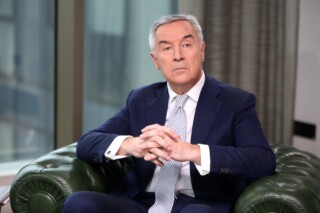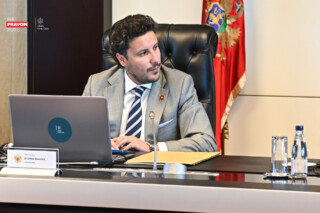He was one of the panelists at the conference „Openness of the Prosecutor’s office – Between confidentiality of the proceedings and the public’s right to know“ organized in Podgorica today by the Centre for Democratic Transition (CDT) and the Supreme State Prosecutor (SSP), in cooperation with the OSCE.
Katnić agreed the obligation of the Prosecution is professional, open and transparent relationship with the media, adding that there are certain limitations entailed by criminal proceedings and that journalists too have to be professional and respect the rule of not disclosing case-sensitive information which would interfere with the judicial process.
“When reporting on criminal proceedings and procedures in certain cases, journalists need to make sure that their reporting is objective and unbiased”, said Katnić.
He pointed out that the prosecution never provided any information to anyone, outside the official communication.
Asked why the prosecutor’s office is posting its answers to a certain news outlet directly on its website, Katnić explained the answers used to be sent directly to media, which often misused them.
Commenting on allegations that the prosecution prefers certain media to provide with information, Katnić said activities are in place to show that this is not true, and to stop the leaking of information.
Lawyer Nikola Martinovic said it is clear that the prosecution has the right to deny the public the right to know certain information, adding that this is the practice in the entire Europe.
“Freedom of expression in Montenegro is sometimes a method for gaining profit. It is absolutely evident that certain data should not be in the media, and yet, there it is. No one wants to say that such disclosure is violation of human rights of people in the process, and that this is in fact about economic interest, larger circulation and viewer ratings”, said Martinovic.
“They publish information of no public significance, aimed solely at scandalization of personality or procedure”, Martinovic added.
While editor in Chief of Pobjeda daily, Drasko Djuranovic, agreed with Katnic and Martinovic, he said the problem is not when a reporter shoots a photo of the defendant, but when certain privileged media publish whole accounts of witess in a proceeding.
“The work of the prosecution should be under public scrutiny.. It is mandatory to complete the investigation into the leaking of information. This process is taking too long, and there were seven or eight recent cases when the „selected“ media published the testimonies of witness-collaborators”, said Djuranović.
Chief editor of Vijesti daily, Mihailo Jovovic, said that no exclusive story published by this media raised its circulation.
“Most institutions in Montenegro would fail if we were grading their communication with the media. Most is trying to conceal information, to not make it public, they refuse to provide answers even to a few simple questions”, said Jovovic, adding that his grade would be C.
He believes that, when the prosecution is working more intensively, they have more material “to show for“, and that they should therefore convene more press conferences, to always keep in touch with the media and the public.
He also said the Chief Special Prosecutor strikes him as a „convincing man who does not avoid questions and gives the impression that he speaks the truth“, which is why he should say who is, how and why waging a war against him.
The panelists also spoke about Katnić’s initiative to amend the Law on the Special State Prosecutor’s Office, which would prevent publishing of any data on the investigative procedure without the authorization of the SSP.
Martinovic said reserving of certain information is not disputable, while Đuranović believes that this proposal is good for society.
Jovovic said the proposal is completely wrong from the standpoint of human rights and the right to information.
Katnić said this is a restriction preventing violation of basic human rights and the interest of the procedure.




